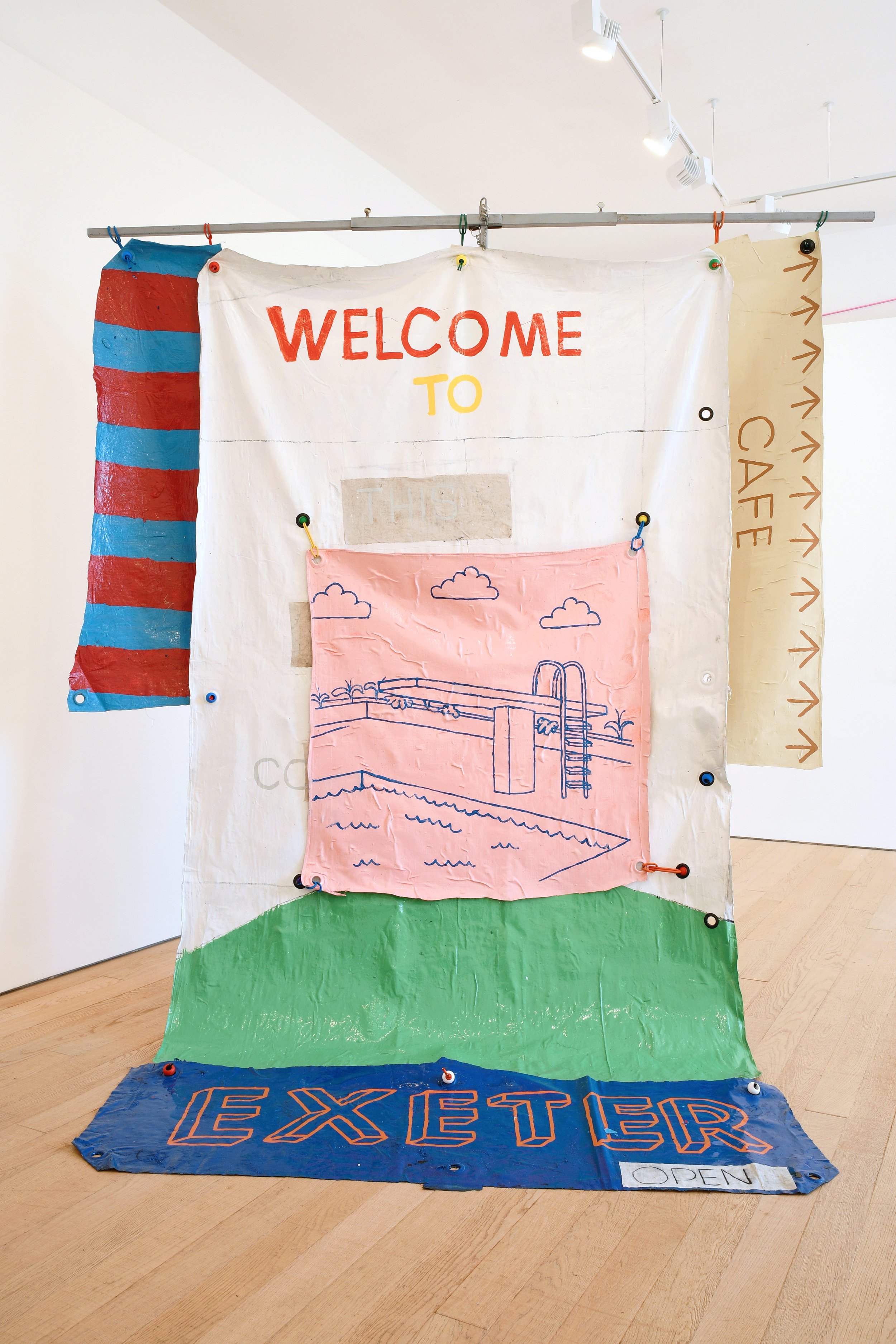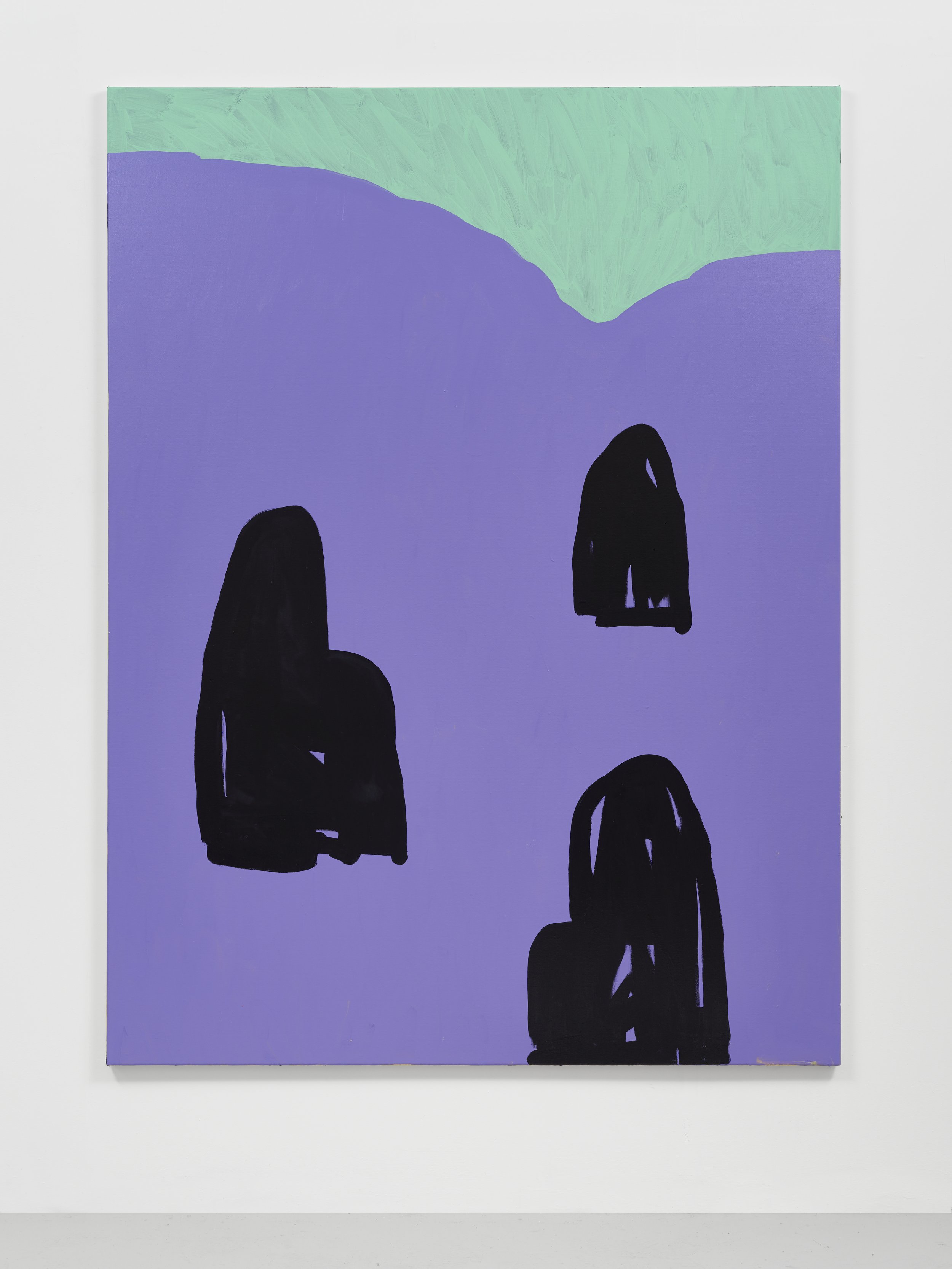














Award Winner 2023
Anna Brass works with a wide variety of materials and processes, primarily in sculpture and filmmaking. She works from a rich collection of images gathered from books, the internet, postcards, museums and galleries. From these, objects are plucked out to materialise in her studio, roughly made out of cardboard and foam, or flattened into carpet-form. They shuffle and switch places, re-assembling into new configurations, in a constant state of flux and her film presents a rich series of tableaux dense with these sculptures, backdrops and makeshift constructions.

Award Winner 2023
Holly Slingsby works in performance, video and painting. Her practice explores belief in various contexts, as well as examining representations of women and the implications of those for women’s societal roles and self-identities. Her visual language reflects a fascination with iconographic traditions, drawing on Biblical imagery, mythologies, and contemporary culture. Her use of gesture and the recreation of poses are fundamental to the work, inviting a reconsideration of accepted depictions of the female form in art and religious contexts and how those permeate wider culture.

Award Winner 2023
Richard Phoenix paints, draws, writes and makes music as part of a practice that aims to help people be together. His work is influenced by many years playing in punk bands and working within learning disability arts. He responds to a fascination with people, using both real and imagined individuals as subjects to explore how our interactions with each other can reveal more profound questions about how the world is structured. His bright and fluid work embraces imperfection to mirror qualities in the world he wants to see himself.

Charlie Duck works with printmaking, painting, sculpture and ceramics to explore drawing and its expanded field. He combines references from art history and personal narratives, drawing connections between disparate sources to explore the fallibility of memory and what society chooses to celebrate and why. With each material and process, the tension between control and chance is key; developing work through experimentation and a fascination with the unexpected and unfamiliar.

Flirting with the vernacular of children’s book illustration, and making reference to art history, popular culture, performance, theatre, and dance, David Caines’ paintings introduce us to a skewed and malicious cast of monsters, clowns, bears, pixies, trolls, dolls and people. Disinterred objects and images return – reanimated, reassembled and mutated in ‘Ordinary Monsters’, an ongoing series of paintings exploring awkwardness, ritual and the ridiculous.

Hesi Glowacki’s work pivots around memory, trauma, personal histories, and their effect on the body. Inspired by stories, personal experience, fashion photography, literature and magic realism, he simultaneously paints an imaginary world that doesn't exist, while documenting a world he places himself in. Drawing from concepts of ritual and ceremony and the notion of renewal and transformation, he aims to alter the idea of the body as a victim of trauma and frame it instead as a site of power and beauty.

Jack Jelfs is an artist, filmmaker and musician with a background in philosophy and theoretical physics. His artistic practice is frequently concerned with questions relating to time, consciousness and the nature of being, with the ultimate aim of discovering new features of the human experience. His work often takes the form of installations that combine single or multi-channel video with live musical elements and / or electronic devices that he designs and builds.

Jonathan Michael Ray's practice is deeply connected to his surroundings. He takes inspiration from a variety of sources such as ancient alphabets, archaeological collections, and sacred sites, but also science-fiction, fantasy and modern abstraction. Ray examines the multilayered histories, fictions and beliefs assigned to artefacts, materials and the places he encounters. Elements of collage and assemblage are often used, including found objects and images, as well as material direct from the landscape, appropriating their symbolism while creating a new context and meaning.

Lois McKendrick is an artist and facilitator influenced by multi-functionalism, textile folk history and utopian city dreamers. She is currently working between drawing and textiles; representing and creating sites for communing, activity and inactivity. Her large, bright fabric sculptures for are conceived for display, use and play - made as a playful response to the current conversations about AI and the role of an artist; more specifically about an artist’s ability (or not) to represent hands.

Oliver Crowther explores the nature of painting and its possibilities as an idea, an object and a process. His use of old bed sheets, household gloss, charcoal and enamel signwriting oils, is a way of working out what a painting might be. He draws from itinerant street architecture, such as; market stalls; sandwich boards; high-street ‘Golf Sale’ placards or layby fruit sellers’ signs. Words and images may point to actual buildings, places and events and, as objects, they have a performative potential that suggests something transitory, almost disposable.

Rae Birch Carter is a self-taught artist who likes to explore and reflect our screen-based culture in a playful and instinctive way. Mainly working on paper, she is interested in the pressures, pleasures and the isolation that often come with the online world in which so many of us now participate. Her work often contrasts the slickness of these digital spaces with the loose, roughness of hand created monotype printing, drawing and torn up collage.

Toby Rainbird is a figurative painter whose work revolves around capturing quiet and intimate moments, delving into unspoken thoughts and isolated interactions. Working on a small scale, and often painting on found surfaces, he is fascinated by capturing moments that traverse the boundaries between self-reflection, isolation, and unspoken tension. Through an introspective approach to painting, he aims to provide a closed and reflective exploration of his immediate surroundings, offering the viewer a small, coded window into his personal observations.

Tom Crawford’s work is saturated with imagery from the built environment, the in-betweens and edges of cities, moments of anthropomorphism and humour. Painting is at the heart of this multidisciplinary practice, which at times, expands to incorporate moving image, sound, installation and writing. Finding profound meaning in the processes of abstraction, intuition and play, while considering notions of regeneration, collaboration and nostalgia, he is obsessed with the materiality of paint and the ways in which colour, form and surface combine to enact expressive meaning.

With a background in making sculptural installations and collaborative performances, Tom Woolner’s practice has recently shifted towards a practice rooted in experimental drawing processes. His depictions of disembodied anatomical parts float within corporeal landscapes and toy with both architectural and pictorial space. Made through an intuitive and playful process of pouring, piping and squidging, he allows his semi-viscous materials to take control, compressing and comingling, slowly or rapidly congealing, to agree upon a form that sits somewhere between object, drawing and fresco.
